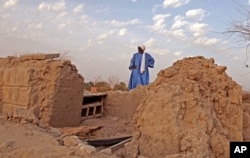The International Criminal Court Tuesday sentenced a former Islamist rebel to nine years in prison for his role in wrecking holy sites in the ancient Malian city of Timbuktu, ending a groundbreaking cultural war crimes trial.
Ahmad al-Faqi al-Mahdi’s sentence was the minimum requested by the prosecution. It was also far less than the 30 years he could have faced for leading and participating in the smashing of 10 holy shrines in Timbuktu in 2012, when Islamist rebels controlled the renowned trading city.
Al-Mahdi’s early admission of guilt and remorse helped speed his trial that opened in August at The Hague-based International Criminal Court. As presiding judge, Raul Pangalangan pointed out it also factored into the sentencing.
“The chamber has found no aggravating circumstances, and five mitigating circumstances. Namely your admission of guilt, your cooperation with the prosecution, the remorse and empathy you have expressed for the victims, your initial reluctance to commit the crime and the steps you took to limit the damage caused, and even of limited importance, your good behavior in detention," said Pangalangan.
The trial was the ICC’s first-ever to consider cultural destruction as a war crime. Some observers say they hope it may set a legal precedent for similar cultural crimes, such as the destruction of ancient monuments in Iraq and Syria by Islamist rebels. Rights groups also want the ICC to investigate broader crimes committed during Mali's 2012 conflict.
Al-Mahdi’s conviction amounts to only the fourth the ICC has delivered since it began operating in 2002. The court, which has indicted individuals ranging from Ugandan rebel leader Joseph Kony to former Ivorian President Laurent Gbagbo, has also acquitted one defendant.










